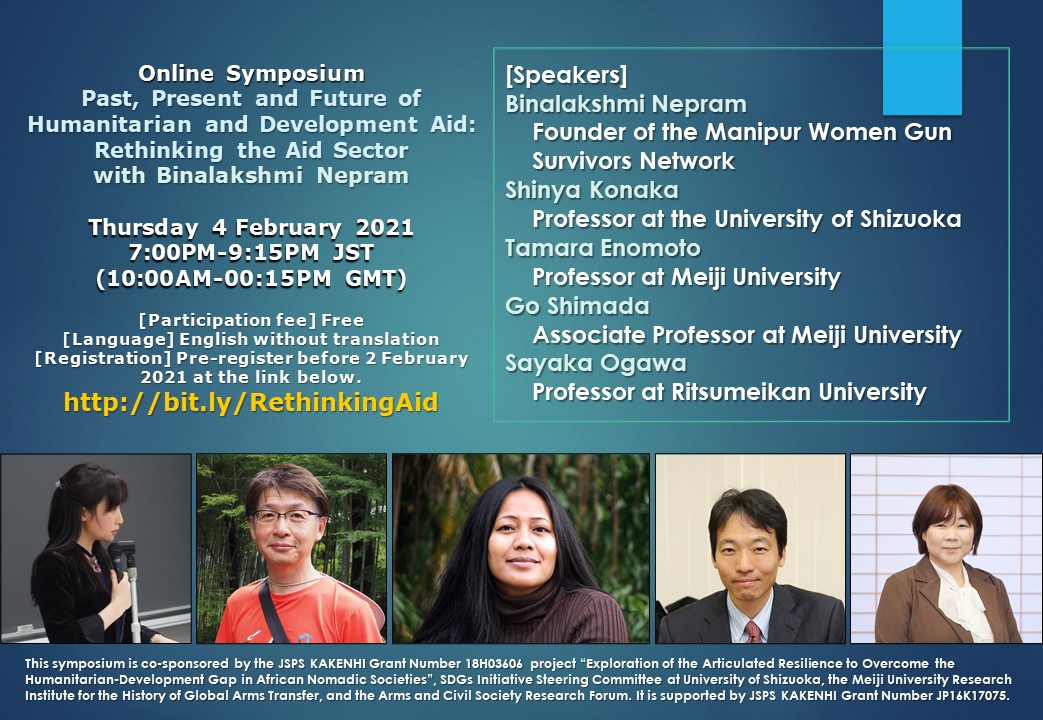Thursday 4 February 2021 Online Symposium
Past, Present and Future of Humanitarian and Development Aid:
Rethinking the Aid Sector
with Binalakshmi Nepram
In 2020, the COVID-19 pandemic and the Black Lives Matter movement stirred renewed debate about how the aid sector operates. Calls emerged on the social media to rethink humanitarianism, to decolonize development, to localize aid, and to address the hypocrisies and structural problems that have long underpinned international aid.
In this symposium, we invite Binalakshmi Nepram, founder of the Manipur Women Gun Survivors Network and one of the leading humanitarian activists from Asia, to discuss whether we should, and can, change how the aid sector works.
Date and time
Thursday 4 February 2021, 7:00PM-9:15PM JST (10:00AM-00:15PM GMT)
* The event will take place on Thursday 4 February 2021 from 7:00 pm to 9:15 pm JST (Tokyo time).
You can confirm the time of the event in your time zone using this Time Difference Calculator. https://www.timeanddate.com/worldclock/converter.html.
Participation fee
Free
Language
English without translation
Registration
Pre-register before 2 February 2021 at the link below.
* The symposium will be held using Zoom. We kindly request all participants download the software prior to the conference. Specific login instructions including Zoom ID and passcode will be sent one day prior to the start of the conference, via email, to all registered attendees. Your information will be kept confidential by one of the co-sponsors (Arms and Civil Society Research Forum) and will only be used to provide you with information on its events.
On-line pre-registration form
Panel
| Chair | Tamara Enomoto, Professor at Meiji University |
|---|---|
| Presenters | Binalakshmi Nepram, Founder of the Manipur Women Gun Survivors Network |
| Shinya Konaka, Professor at the University of Shizuoka | |
| Tamara Enomoto, Professor at Meiji University | |
| Discussants | Go Shimada, Associate Professor at Meiji University |
| Sayaka Ogawa, Professor at Ritsumeikan University |
Sponsors
This symposium is co-sponsored by the JSPS KAKENHI Grant Number 18H03606 project “Exploration of the Articulated Resilience to Overcome the Humanitarian-Development Gap in African Nomadic Societies”, SDGs Initiative Steering Committee at University of Shizuoka, the Meiji University Research Institute for the History of Global Arms Transfer, and the Arms and Civil Society Research Forum. It is supported by JSPS KAKENHI Grant Number JP16K17075.
Biographies of the speakers
Binalakshmi Nepram, founder of the Manipur Women Gun Survivors Network, is a writer, humanitarian and civil rights activist on women-led peace, security and disarmament. She is the recipient of several national and international awards, including the Best Humanitarian Initiative of the Year 2010, the Sean MacBride Peace Prize for disarmament work in 2011, the CNN IBN Real Heroes Award in 2011, Ashoka Fellowship by the Ashoka: Innovators of the Public of Washington, and the L’Oréal Paris Femina Women Award 2015 under the category of "Face of A Cause". In 2018, RAW in WAR (Reach All Women in WAR) honoured her with the 2018 Anna Politkovskaya Award, which she shared with Belarussian writer and 2015 Nobel Prize winner in literature, Svetlana Alexievich. She also won the Sathya Sree Award for Human Excellence 2018 and Northeast Biographers International Humanity Award 2019.
Shinya Konaka is Professor and adviser to the President at the University of Shizuoka. He has been carrying out his field research among East African pastoralists since 1990. He received the 13th Okita Prize of the International Development, the 8th Japan Consortium for Area Studies Award for Prominent Scholar, and the JASID (The Japan Society for International Development) Special Award, 2018. His recent publications include S. Konaka & X. Sun (eds.) African Study Monographs. Supplementary issue, 53, (2017), Livestock as Interface: The Case of the Samburu in Kenya. I. Tokoro and K. Kawai (eds.) Anthropology of Things (2018, Trans Pacific Press).
Tamara Enomoto is Professor at Meiji University. From 2013 to 2015, she worked at Oxfam where she was in charge of policy, advocacy and research on humanitarian and arms control issues and coordinated humanitarian aid and advocacy projects. Her recent publications include Weapon Taboos: Genealogies of Pariah Weapons (2020, Nihon Keizai Hyouronsha, edited book), The Arms Trade Treaty: The Self, Sovereignty, and Arms Transfer Control (2020, Kouyou Shobou), and “Demarcating Battle Lines: Citizenship and Agency in the Era of Misanthropy” in I. Hazama, K. Umeya, and F. B. Nyamnjoh (eds), Citizenship in Motion: South African and Japanese Scholars in Conversation (2019, Langaa RPCIG).
Go Shimada is Associate Professor of Meiji University, Visiting Scholar of Shizuoka University, and Adjunct Researcher of Waseda University. Before this, he was Associate Professor of the University of Shizuoka, Visiting Scholar at Columbia University, First Secretary, Permanent Mission of Japan to the United Nations, and worked for JICA in various positions. His publication includes Shimada, Go "Does Environmental Policy Make African Industry Less Competitive? - The Possibilities in Green Industrial Policy." in R. Kanbur, A. Noman and J. E. Stiglitz R. Kanbur, A. Noman and J. E. Stiglitz (eds), The Quality of Growth in Africa (2019, Columbia University Press).
Sayaka Ogawa is Professor at Ritsumeikan University. She has specialized in cultural anthropology. Her research theme is exploring how marginal people can construct their own life-world while adapting to the logic of global capitalism, and how they can build their own communality for a mutual security, while with respecting autonomy and heterogeneity. Recently, she is conducting research about informal trade using ICT between Asia and African countries in order to discuss the possibility and problem of platform capitalism. Her resent publication titled “A Boss of Chungking Mansions Knows: Anthropology of Underground Economy” won the 51st Oya Soichi nonfiction award and 8th Kawaihayao academic prize.




